
Build my resume
- Build a better resume in minutes
- Resume examples
- 2,000+ examples that work in 2024
- Resume templates
- Free templates for all levels
- Cover letters
- Cover letter generator
- It's like magic, we promise
- Cover letter examples
- Free downloads in Word & Docs

9 Academic Resume Examples [& Templates]
Best for senior and mid-level candidates
There’s plenty of room in our elegant resume template to add your professional experience while impressing recruiters with a sleek design.
Resume Builder
Like this template? Customize this resume and make it your own with the help of our Al-powered suggestions, accent colors, and modern fonts.
Academic Resume
- Academic Resumes for Students
- Academic Resumes for Advisors
- Other Academic Resumes
How to Write an Academic Resume
If you’re applying to a Ph.D. program, looking to be a research assistant, or planning to teach at the college level, employers may request that you submit a CV instead. There are some key differences between a CV and a resume you’ll want to know about.
If you’re still looking to generate a cover letter or write a resume , stick with us. We’ve reviewed hundreds of academic resumes and highlighted common mistakes job seekers make. With this information, we’ve created the perfect resume for applicants in various academic fields and practices.
Whether you’re looking for a job as an academic advisor or wanting to advance your research or student career, we’ll show you the best nine academic resume samples that worked in 2024.
or download as PDF
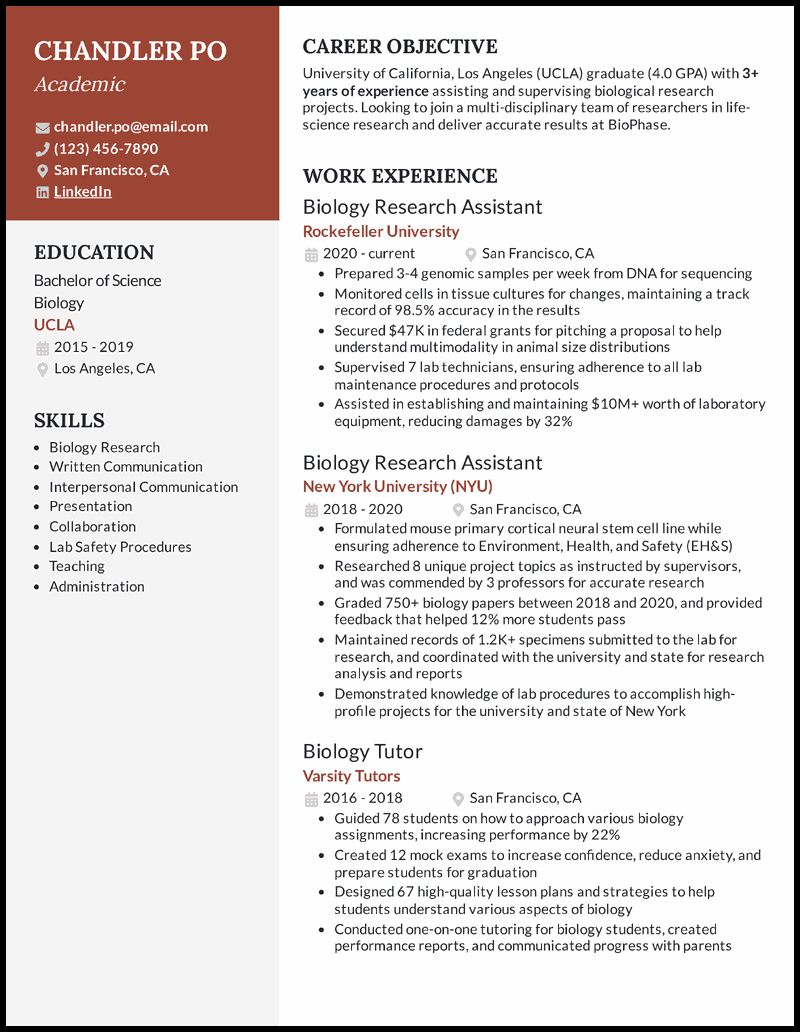
Why this resume works
- Be specific and to the point while conveying your best.
- Customize your objective by mentioning the target business by name and sprinkling in some relevant keywords from the job description .
- Use industry-specific terms in your academic resume and pepper it with solid metrics to demonstrate your impact.
- For example, saying you “prepared 3-4 genomic samples per week from DNA for sequencing” shows your industry familiarity while using numbers to offer an easy-to-read glimpse of your duties.
Scholarship Academic Resume
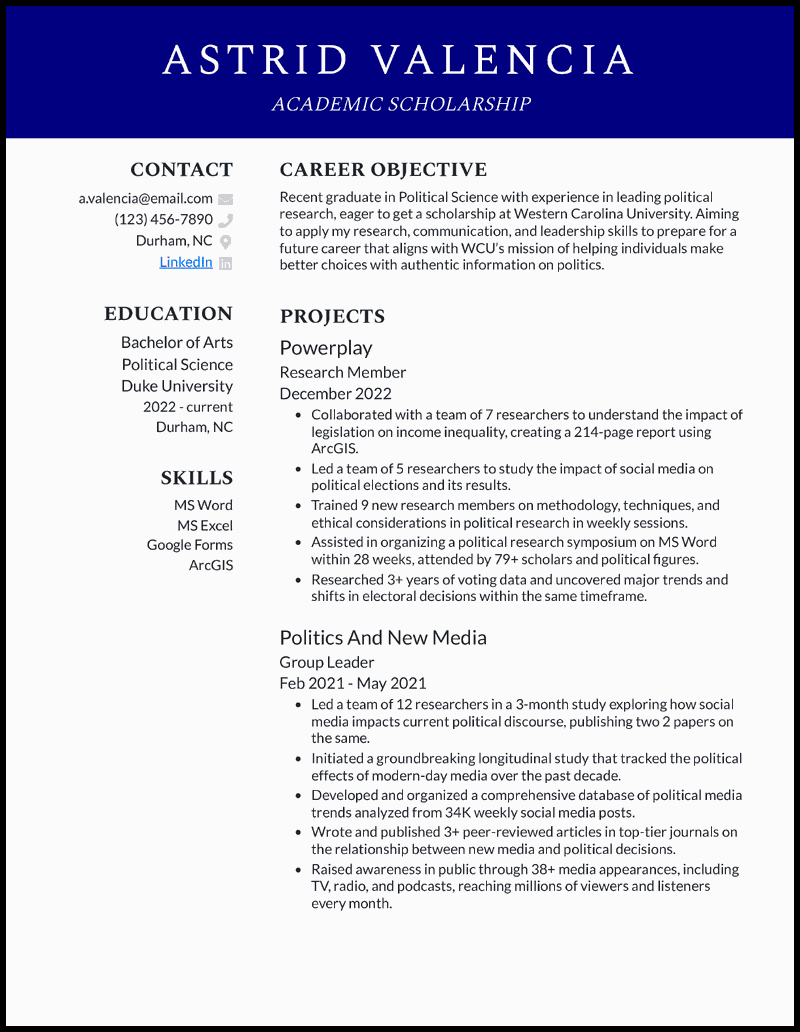
- Add any projects that you’ve been a part of or have volunteered for. Since you’re only a graduate, academic institutions know you won’t have much experience to showcase. As long as your resume contains coherent future goals backed by relevant experience, you’ll be good to go!
High School Academic Resume
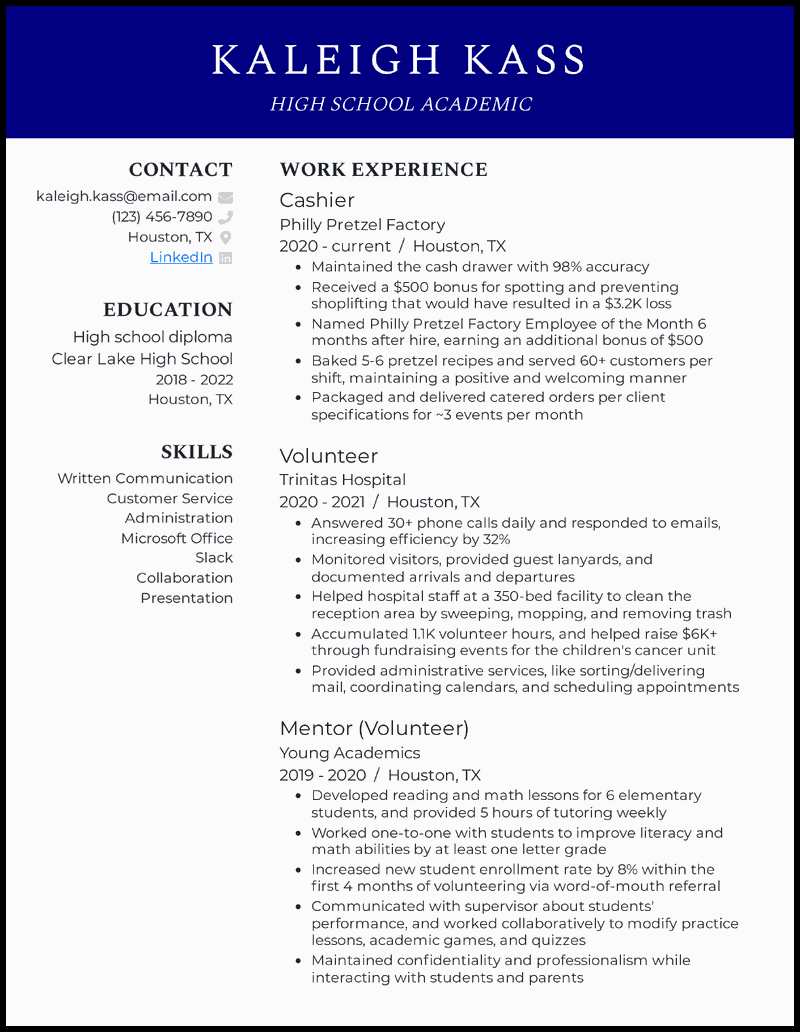
- When writing your high school academic resume , try to be concise without leaving out important information. Using words like ‘successfully’ or ‘skillfully’ will only take up extra space and may be considered filler.
- We suggest using the reverse-chronological resume format for an easy-to-read, logical flow.
- Reverse-chronological formatting orders your work experience and education from the most recent to the oldest, so employers get to the most relevant stuff first.
- Double-check your resume work experience bullet points to ensure they take less than three lines and stick to between 20 to 200 characters per bullet.
College Academic Resume
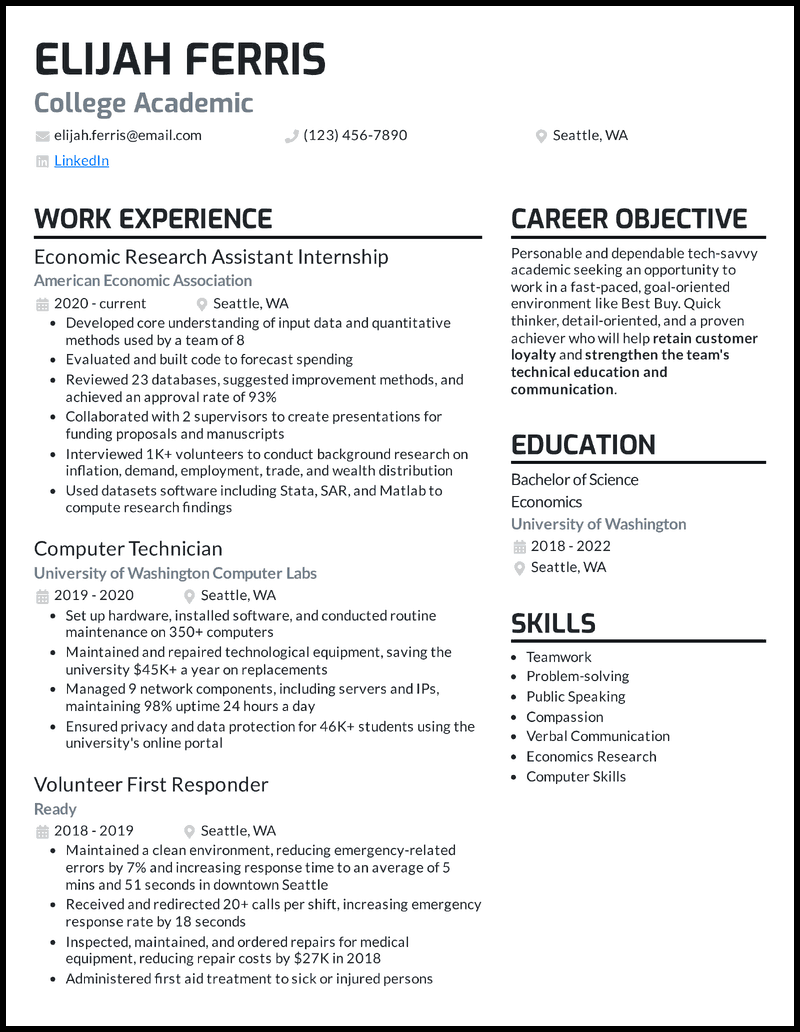
- The most critical sections in your college academic resume are the contact information, work experience, skills, and education.
- For example, “Inspected, maintained, and ordered repairs for medical equipment, reducing repair costs by $27K in 2018” proves that you won’t need a lot of training and will add value right away.
Grad School Academic Resume
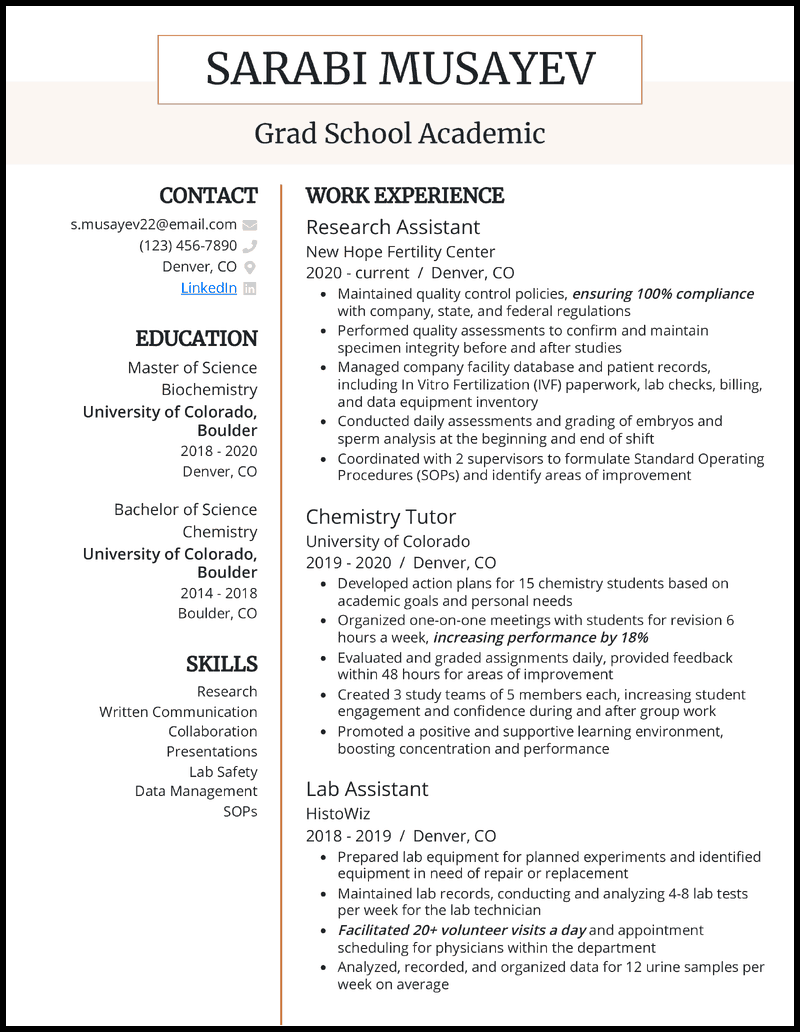
- Your grad school academic resume should highlight your dependability and commitment to excellence.
- For example, “Developed action plans for 15 chemistry students based on academic goals and personal needs”
- Lastly, polish it off with a hint of subtle color for pop while remaining professional, and don’t be afraid to have just a touch of white space.
Academic Advisor No Experience Resume

- If you have any project experience with researching fields of study or guiding students toward their future, add them at all costs! Any amount of experience with improving a student’s learning ability and grades will do wonders too.
Academic Advisor Resume
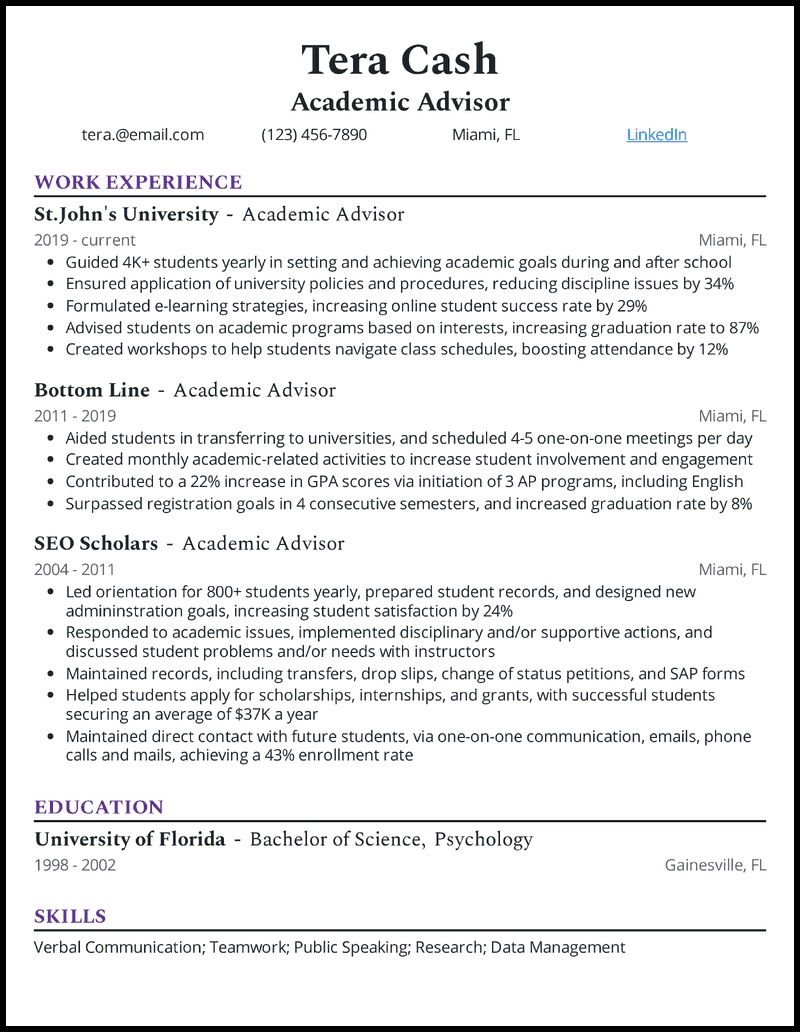
- Quantifying your impact provides a numerical overview of what recruiters can expect from you.
- How many students did I advise?
- Did I help students obtain scholarship money? If so, how much?
- Did I get positive performance reviews?
- Don’t exaggerate your results or resume skills , hoping to impress recruiters. It will break their trust and put too much pressure on you if hired.
Academic Coach Resume

- This won’t just underscore your commitment to continual learning and adherence to international coaching standards. It also reflects your expertise in dealing with familial and youth-related situations, a skill crucial for academic mentorship. Other certifications you could flaunt in your piece are Instructional Coaching Penn GSE and ALC Academic Life Coaching.
Academic Library Resume

- Suppose you once served as a receptionist where you handled social media, managed documents, or used tools like Microsoft Teams to better communicate with internal teams. Transferable skills learned from these experiences can prove useful in your quest for the library role.
Related resume guides
- Grad school
- Teacher Assistant
- College graduate
- Executive assistant

No matter where you are in your academic career, we can walk you through in four easy steps how to write your own academic resume. As you work through these steps, you’ll find the academic resume samples above will help you stay on track and give you the inspiration you need to make your own.
Use a reverse-chronological format to list experience, volunteer efforts, and personal and academic projects. If you’re between early high school or post-graduate school, we bet you have academic and personal projects, like research, internships, mentoring, volunteering, etc. that you can talk about in reverse-chronological order.
Functional and combo formats are tempting, but a reverse timeline will give recruiters the best insight into your skills and what you offer.
Especially if pursuing higher education, list the school, degree, and year you earned the degree in your academic resume. If you’re still studying, set the date to the anticipated graduation year.
List relevant courses to your degree plan. For example, if you’re a Biology major wanting a research assistant position, Biology of Mammalian Cells and Tissues would be a relevant course. You can also include a high GPA as well as honors, awards, and affiliations.
Briefly explain how the skills you’ve gained from your academic background (UCLA graduate with 3+ years of assisting and supervising biological research) couple well with the role (collaborate with a multi-disciplinarian team in life-science research) you’re seeking at a specific organization.
As you read a company’s job ad, what qualities and traits are important for the role that resonate with you? Let that be your springboard to write a customized career objective.
Share results whether the work you’ve done has been paid work, volunteer work, or even class projects. For example, maybe you volunteered to mentor students at a tutor center.
Rather than say you developed lessons or communicated with parents, discuss outcomes that speak to your abilities. “Worked one on one with students to improve math scores by one letter grade” or “increased student enrollment by 8% with new referral program” speaks volumes about your work!
These kinds of bullet points also make a great launching pad for story-telling in your academic cover letter .

- A+ Resumes for Teachers
- Resume Samples
- Prices & Services
- Email: Candace Alstad-Davies
- Toll Free: 1-877-738-8052
- Local/Int’l: 780-513-0010

- Resume / Curriculum Vitae Help
- Application / Cover Letter Help
- Job Interview Questions & Answers
- Job Interview Preparation
- Social Networking & Job Search
- Education Job Search Tips
- Philosophy of Education Statement Help
- Career Changes to/from Education
- Career Development / Educational Skills
- International / Overseas Teaching
- ESL English as a Second Language
- Classroom Management Strategies
- Personal Development
- Higher Education Career Tips
- School Principal / Administrators Job Search Help
15 Higher Education Resume Writing and Formatting Tips
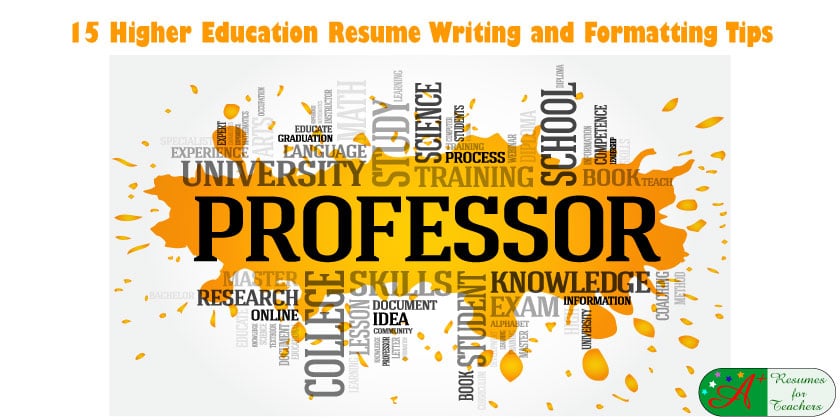
Discover the ultimate higher education resume writing tips to land the perfect position at a college or university. As I am sure you know, your resume or curriculum vitae (CV) is the key to opening doors to interviews.
It lets you showcase your relevant skills and expertise for the job opening. This is your time to impress, as an effective resume concisely describes your professional skill set and how you have succeeded in your previous positions. A quality higher education cover letter and your resume should intrigue the reader, encouraging them to get to know you better and how you could fit within their institution.
Top Professional Resume Tips for Higher Education Teaching Professionals
Professional profile.
Resume objective statements are old school. They do not add value to your document. A professional career summary or profile should begin your resume with a brief description of your soft skills. This is the first point in your resume where you can showcase your skills, expertise, and passion for the position you are applying for.
Ensure that you create this summary based on the specific position. This lets the person reading it know you took the time to understand what the college or university is looking for in a candidate and target your valuable assets to the position requirements.
Start your professional summary with a sentence outlining your experience, for instance:
“Passionate, well-rounded, and dynamic educator with nearly 15 years of experience driving interactive and engaging classroom discussions where students are held accountable for recognizing the connection between learning and experience.”
This would be an excellent introduction to an Adjunct Professor’s resume.
The professional profile is the opportunity to convey some of your essential skills and use some academic buzzwords in a meaningful paragraph before you delve into your hard skills and professional background.
Areas of Expertise – Examples
This area of expertise section of your higher education resume should be littered with educational buzzwords/keywords that you find in the job posting. This is where you can insert relevant keywords and job competencies that the Applicant Tracking Systems will pick up instantly. Ensure that the characteristics you insert apply to your background and what the institute would look for in an applicant.
One resume writing tip a university instructor might use is to develop a bullet point list of 10-12 core competencies highlighting the areas of expertise. These strengths will communicate that you know the teaching skills and areas needed to perform the job you wish to secure.
Sample Areas of Strength to Include in Your Resume
Adjunct professor:.
Student Connections, Subject Matter, Curriculum Development, Instructional Design, Real World Applications, Creative Problem Solving, Academic Policies, Classroom Management, Feedback and Assessment, Mentorship, Student Management Systems
Dean of Students:
Student Retention, Crisis Management, Diversity and Inclusion, Student Development Theory, Policies and Procedures, Professional Development, Policy Development, Program Review, Faculty Evaluation.
Chief Financial Officer:
Financial Reporting, Capital Management, Budgeting and Forecasting, Risk Management, Treasury Management, Compliance and Governance, Stakeholder Relations, Strategic Planning, and Regulatory Grant Funding.
Communications Director:
Communication Strategies, Strategic Communication, Public Relations, Crisis Communication, Professional Leadership, Attention to Detail, Brand Management, Digital Communication, Social Media Branding.
Department Chair:
Academic Leadership and Administration, Research and Scholarship, Program Development & Management, Supervision of Teaching, Program Evaluation, Conflict Resolution, Strategic Planning, and Data-Driven Decision-making.
College Student Advisor:
Student Counseling & Support, Academic Advising, Data Analysis, Interpersonal Communication, Academic Educational Guidance, Crisis Intervention, Program Coordination, Reporting, Case Loads.
Co-op Advisor :
Career Preparation, Academic Integration, Data Management, Compliance and Policy, Materials Development, Learning Management Systems, Student Support, Progress Monitoring, and Work Term Monitoring.
Higher Education Resume Keywords
Larger employers use applicant tracking systems to weed out resumes as the initial review. A concrete way to pass this initial review is to include relevant industry keywords or buzzwords specific to the position you are applying for and apply them to your skill set. Use the job description to determine what knowledge, skills, and qualifications the employer values, and sprinkle those words throughout your resume.
For example, an Adjunct Professor should possess organizational skills, be an effective communicator, be technologically savvy, and support colleagues .
One thing to remember is to build the wording from the job posting into your resume. If the posting states, “ individualized lesson planning a plus ,” incorporate that into your resume as “ Experience in creating individualized lesson plans to encourage full student participation and engagement based on unique learning styles, needs, and goals .”
Look at the school website, department page, online job descriptions, and other job postings to help determine some key buzzwords to include.
Using the correct keywords is one of the most important aspects of writing resumes or CVs in higher education or any other industry.
Education and Credentials
Most higher education positions require applicants to have a minimum of a bachelor’s or master’s degree. Take a close look at the job posting to determine the educational requirements and think about listing those relevant to the position. There is no need to list your high school diploma.
If a significant amount of time has passed between achieving your last degree and the date you are applying for a new position, consider not including graduation dates.
A general rule of thumb is to start your education list with the most recent completions. State the name of your degree, the institution, and the institution’s location, then the year of graduation or expected completion, if applicable. Under your education, include any teaching certifications or other credentials you have received.
Include Thesis Details
Suppose you have obtained your master’s degree or doctorate. In that case, you may want to include your thesis statement within your educational experience section, especially if it is relevant to the subject you wish to teach. Include below the institution where you received the degree and put it in italics so it stands out without removing the educational listing.
For instance:
Thesis : “ The role of nature vs. nurture and its impact on children’s early childhood and elementary education. ”
Thesis : “Homework and Achievement: Investigating the role homework plays on student achievement.”
Teaching or Professional Experience
In the professional experience section of your resume, include a brief description of your job duties and responsibilities, followed by a listing of your achievements within that position. Ensure that you list your most recent post first, and if you are no longer at the job listed, write your description and accomplishments in the past tense.
Listing your achievements in bullet form makes them stand out within the resume. The achievements must reflect any classroom experience, school community involvement, and educational improvements you made in your past experiences.
Depending on the position you are applying for in higher education, you may have previous accounting experience, board positions, or professional jobs other than teaching.
Suppose you are applying for an adjunct teaching position in a corporate career. In that case, you will want to highlight any subject-related experience and skills you have and any training or presentation experience.
Here are a few examples of work experiences.
Dean of students resume excerpt sample excerpt:.
Maintained student service and academic program offerings for 10,000 on-campus and 15,000 distance education students. Established development and institutional advancement initiatives. Addressed diversity issues within the college curriculum, oversaw residential housing operations, and recruited senior administrators and academic staff.
- Established a campus crisis counseling initiative for students and families in the dean’s office.
- Organized and facilitated ten-week-long educational program events that increased academic participation by 20%.
- Created a comprehensive communication and training program to meet senior academic staff’s diverse needs, goals, and learning styles.
Director of Alumni Relations Resume Sample Excerpt:
Advise and administer the development and management of alumni events and volunteer programs. Identify, cultivate, and solicit alumni prospects for annual gifts and educate graduating students about alumni benefits and philanthropy. Ensure accurate and complete alumni database records utilizing state-of-the-art technological programs.
- Raised $1 million for special projects and events in collaboration with various faculties and the Alumni Association.
- Introduced new and improved database recording technology to create a more effective customer service protocol for alumni who emailed, called, or visited campus.
- Coordinated with the Senior Director of Alumni Engagement to create and execute a more comprehensive approach to alumni engagement by creating online chat rooms and on-campus clubs.
Professional Development and Other Resume Headers
After completing the professional experience section, you can decide what further headings to include on your higher education resume. Some examples of additional sections that you can have are:
- Professional Development
- Professional Affiliations
- Presentations
- Publications
- Volunteer Experience
Try to keep the information specific to the job you are applying for. If you have volunteer experience with no transferable skills, do not include it, as you want to maintain a job-specific tailored resume.
Another point to remember is not to overload your resume with information that may not necessarily be required to obtain your next job as an Adjunct Professor, Chief Technology Officer, or Director of Education. If you find your resume getting too lengthy after including your extracurricular involvement, then take the time to review it and thoroughly think about what could be removed to maintain an acceptable length.
Remember, though, that if the job posting requests an academic CV, they expect a more extended version of a resume that will include all of these sections.
Quotes and Recommendation Statements
If you have meaningful quotes from colleagues or supervisors that describe vital skills and attributes that connect you to the position you are applying for, why not include them on your resume? If you do not have space in your resume or would rather have a quote at the bottom of your cover letter, go for it.
If you include a testimonial/quote on your resume, the best places to insert the one or two lines are at the top of the page, above your professional profile, or at the bottom of the resume. Do not forget to include the name of the person who provided the quote and italicize the lines to stand out against the other resume font. Here is an example:
“Ms. Smith is a very creative and collaborative leader who has provided our district with exceptional support and programs, ensuring success for all teachers and students.”
Dean Quinton, Principal
Focus Your Resume to Match the Job Position
What to include in your resume will depend on your expertise, professional background, skill set, and what position you are hoping to secure. By closely examining the job, you can better understand what the institution is looking for in a qualified candidate.
If you are applying for a position that is the next step in your career path, such as transitioning from an instructor to a dean position, then include the relevant skills to secure an interview for the Dean of Students. However, if you want to enter the college or university scene as a professor or adjunct instructor, you would include a much different set of skills. You may use some transferable skills from previous employment.
A critical tip to tailoring your higher education resume is to ensure the content matches what the educational institution is looking for. Make them picture you in the position through your experiences and accomplishments.
Use C.A.R. to Determine Accomplishments
One of the best ways to determine your accomplishments is to use the acronym C-A-R: Challenge-Action-Result. When describing your achievements, think of a challenge or task, your strategy to handle it, and the achieved results. Employers are looking for ways to disqualify you, therefore ensure that you clearly outline how your past experiences and successes have benefited the company or institution.
For example:
“Identified district-wide curriculum issues specific to special needs learners. Hired specialists and facilitated workshops for special education teachers to eliminate issues.”
“Implemented Fountas and Pinnell Reading Program to help all students jump a minimum of one reading level by year-end.”
“Introduced an after-school peer support program to encourage students to help one another with their studies while tackling social problems and increasing peer friendships; resulted in decreased problem behaviors and increased understanding of the material.”

Quantify Accomplishments
Numbers go a long way to establish your achievements in a more meaningful format. Numbers stand out against a sea of words, so as often as possible, quantify your accomplishments using numbers as much as possible.
Here are a few examples:
“Boosted student attendance by 10% by restoring student-faculty relationships.”
“Reduced student discipline rate by 8% by implementing restorative discipline program.”
“Increased students’ final exam marks by 20% by implementing a study tutorial program.”
This is probably the most crucial step in writing your higher education resume. Always proofread your work for spelling and grammar. Being able to submit a resume that is free of mistakes and looks polished will undoubtedly be worth the time you take to read it over a few times. Make sure that the spelling is correct and that your dates and address information are accurate. A great tip is to have a friend re-read your resume to see anything you missed.
Research Faculty Institution
Investigating the college or university mission, future goals, and position expectations can go a long way when applying for the next step in your career. Avoid using the first person when describing the capabilities you will bring to the position. Simple statements that connect the job description to your responsibilities show that you have read and thought about the requirements specified in the posting.
Resume Formatting and Design
Your resume’s overall formatting should be consistent with the other submitted documents. This means your resume, cover letter, thank you letter, reference page, etc., should all have the same header, margins, font style and size, and borders, if applicable. Bold or italicize your name and section headings, and keep your qualifications the focal point.
Summing it Up!
Being organized is a top skill for any position in the higher education field. Ensure that your resume or curriculum vitae looks professional and clean, which will easily translate to your academic skill set. Read the job description and posting in detail to tailor your resume or CV to match. This will set you apart from other candidates and land your application in the interview pile.
Use metrics throughout your work. This will showcase your accomplishments in detail and allow the reader to input your hard skills into the position you are applying for.
There are many ways to write a professional resume for your next job as Dean of Students or English Professor. Follow the tips outlined above, and you will surpass the other applicants and sit across from the interview panel in no time.
Take the time to review resume samples to get ideas for formatting, content, keyword placement, and organization.
If you need help writing your job search documents, including a strong higher education resume and cover letter, contact me (Candace) at 1 877 738 8052 or email me.
Next post: 10 Job Search Mistakes Educators Make and How to Fix Them
Previous post: Teacher Resume Objective Statements are Old School
Sign-up to receive free career tips and strategies
Search our site.
Candace Alstad-Davies | Email: [email protected]
Fax: 775-593-3556 | Toll Free: 1-877-738-8052 | Local/Int’l: 780-513-0010
Prices & Services | Free Newsletter | Privacy Policy | About Us | Contact
© A+ Resumes for Teachers 2001 – 2024
Privacy Overview
- • Dean's Fellowship for Graduate Study (2018-2023) - Outstanding academic achievement and potential in the field of Psychology.
- • Led a multi-disciplinary research project on social interaction, integrating neuroimaging, behavioral data, and machine learning.
- • Supervised and mentored 4 graduate students, enhancing their skills in psycho-physiological data collection and analysis.
- • Secured $200,000 in research funding to explore AI-driven analysis of social networks and interactions.
- • Collaborated with a team of neuroscientists and AI specialists to develop an innovative method for real-time monitoring of group dynamics using remote sensing.
- • Conducted in-depth research on dyadic social interactions using psychophysiological measures, leading to 3 peer-reviewed publications.
- • Developed and validated a new protocol for the collection of naturalistic conversation data, which was adopted by the lab for ongoing research.
- • Implemented machine learning techniques to analyze large datasets of social network interactions, improving the efficiency of data processing by 30%.
- • Co-authored 2 papers on the influence of cultural differences on social behavior, presented at national conferences.
- • Facilitated interdisciplinary collaborations, integrating perspectives from psychology and computer science in research design.
8 Academic Resume Examples & Guide for 2024
Academic roles focus on teaching, research, and contributing to the educational community. When crafting your resume, highlight your teaching experience, research publications, and involvement in academic committees. Consider incorporating skills such as critical thinking, data analysis, and effective communication. Mentioning successful grant applications and innovative teaching methods will help demonstrate your contributions and impact.
All resume examples in this guide
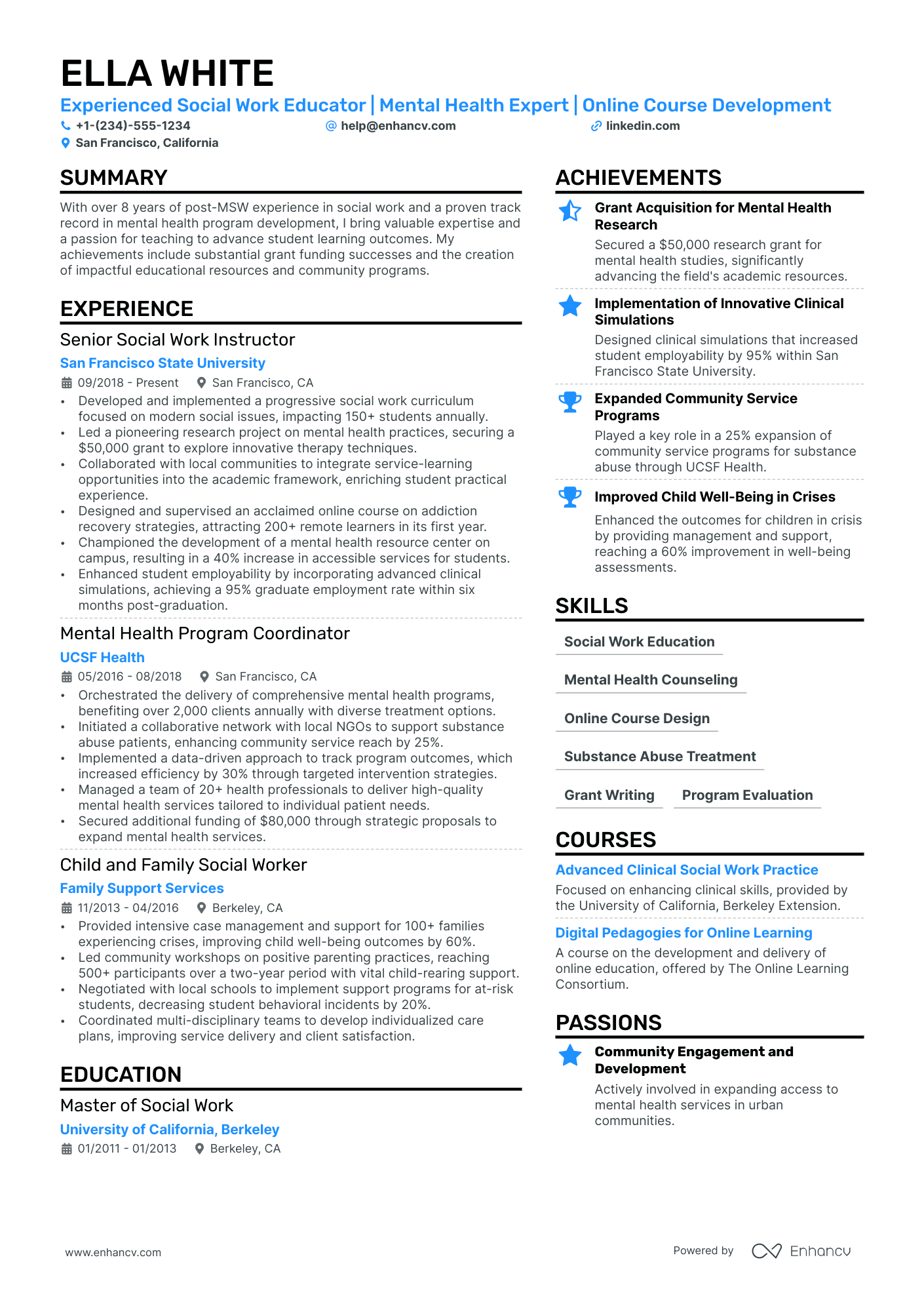
Academic Advisor
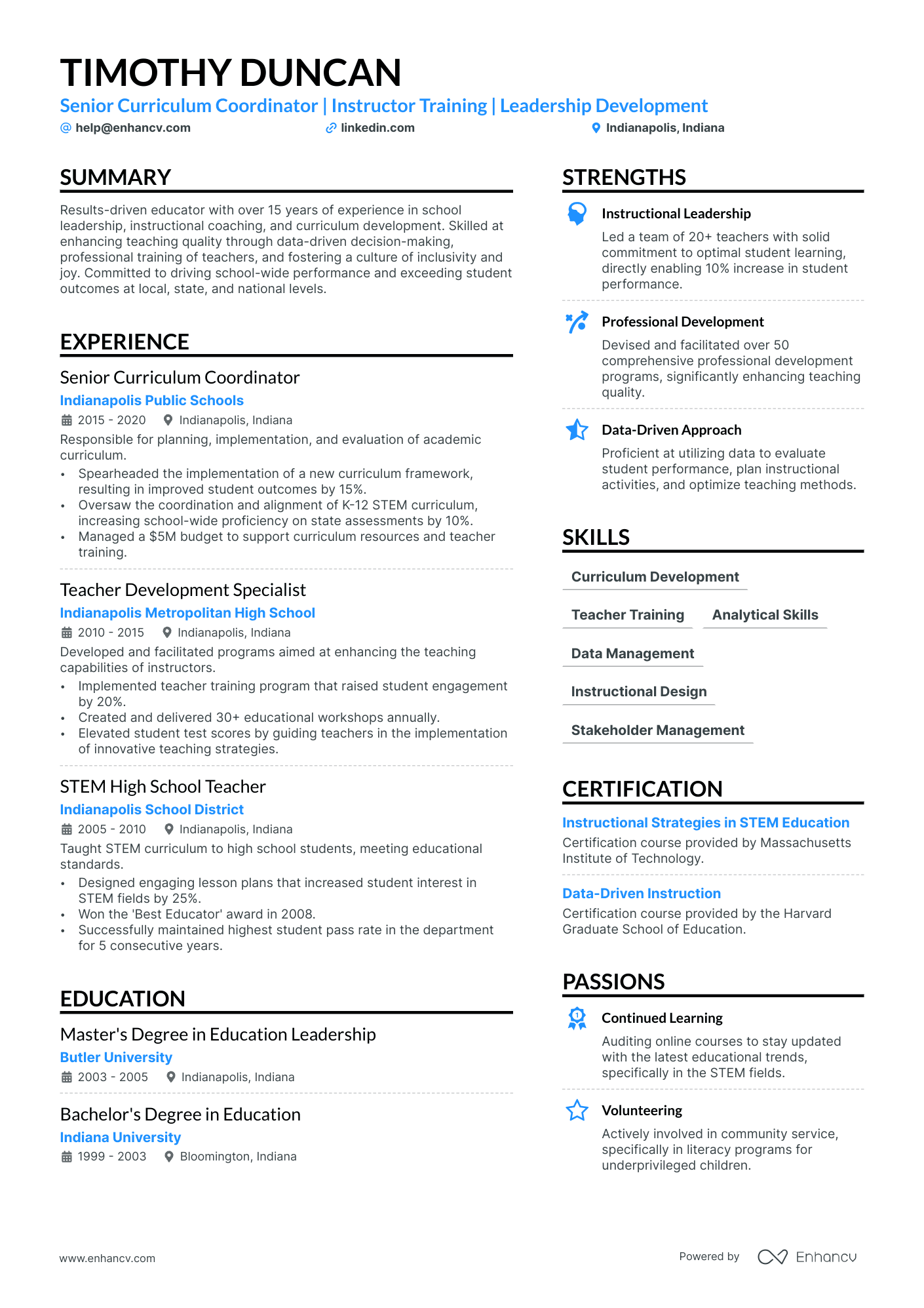
High School Academic
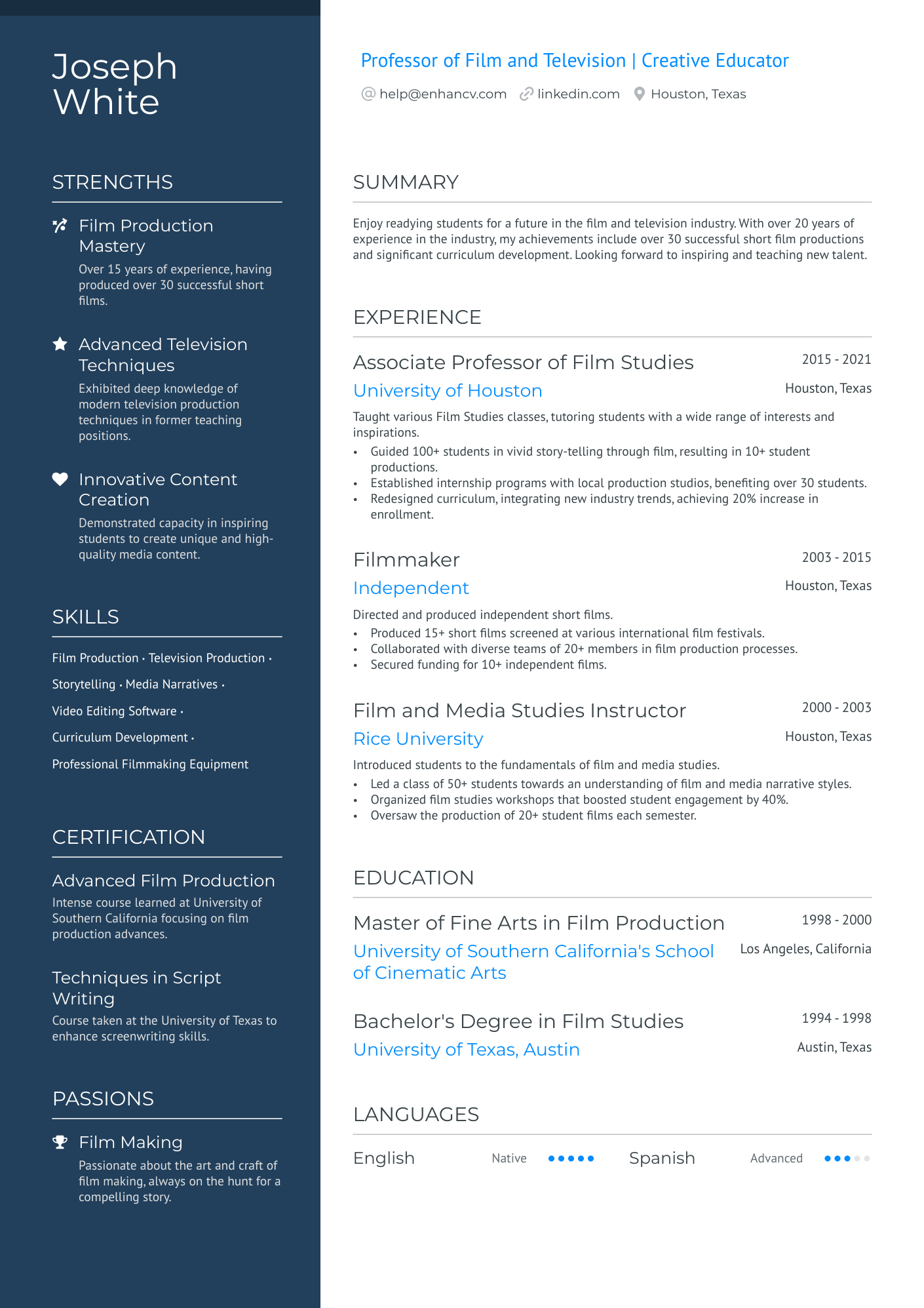
College Academic
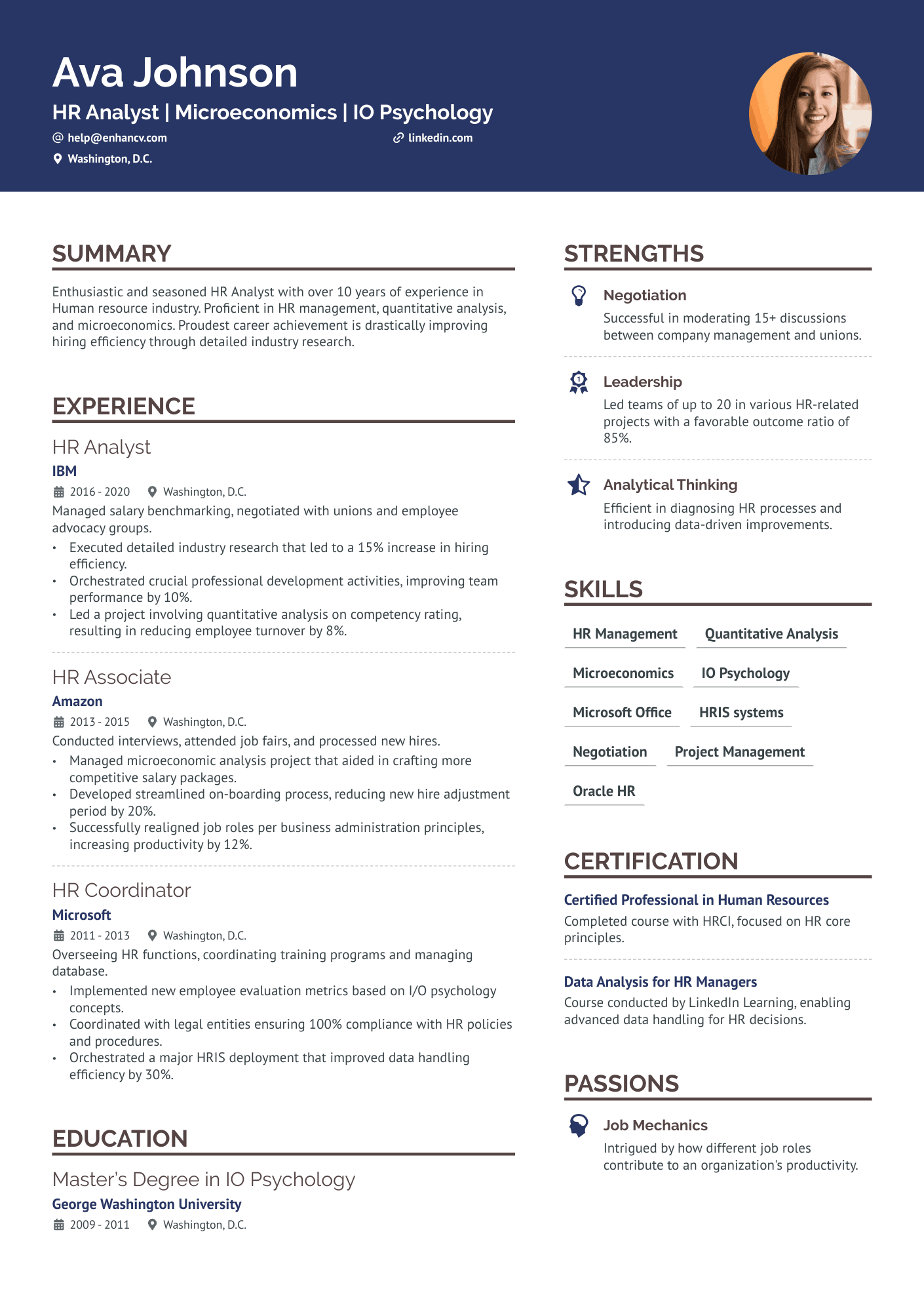
Grad School Academic
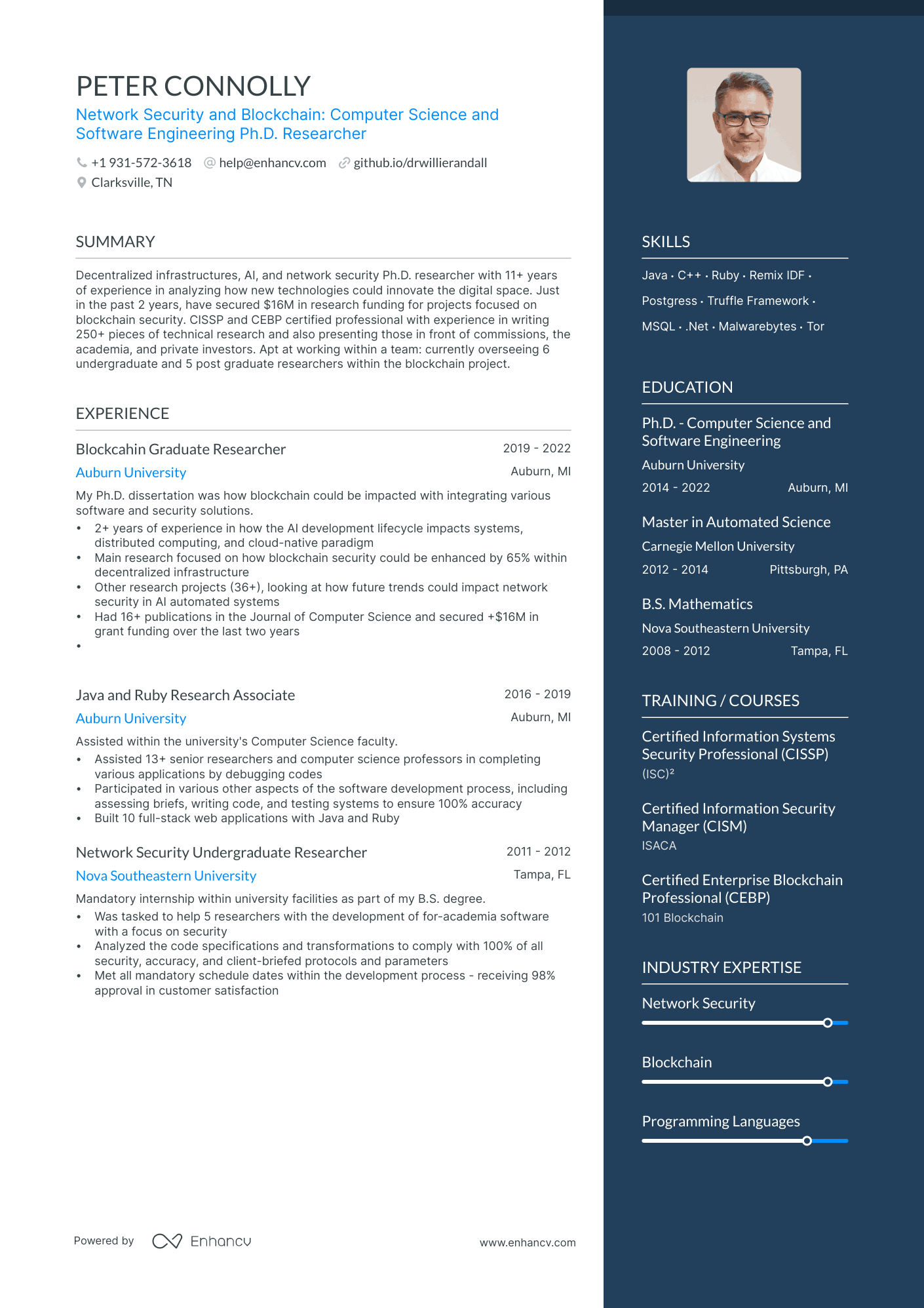
Resume Guide
Academic resume sample.
Academic resume format
Education section
Professional experience
Resume for new academics
Publications on an academic resume
Awards, honors, and grants
Academic skills
Professional profile
Optional sections

The academic job market has become increasingly complex, with tenure-track positions growing at a fraction of the rate of PhD graduates entering the field. As the demand for secure positions outpaces supply , crafting a standout academic resume is more crucial than ever.
This guide will help you highlight your achievements and align your experience with the shifting landscape of academia, ensuring your academic resume—an innovative hybrid between a traditional job-seeking resume and an academic CV —not only showcases your qualifications but also meets the demands of the environment.
More concise and tailored to specific faculty roles, this academic resume guide will be your first step toward securing tenure, whether you’re pursuing a faculty position or a research role.
Key takeaways
- Embrace the new format which provides a concise yet comprehensive overview of your qualifications tailored to the specific academic role.
- Customize your resume to align with the specific requirements of the institution and the job description.
- Place education, employment history, and publications at the forefront.
- Opt for a clear, organized layout with professional fonts and appropriate spacing to ensure readability.
- Include numbers and metrics, especially for administrative roles, to quantify your impact.
- Add sections like professional affiliations, conferences, and references to provide a well-rounded view of your academic contributions.
As you prepare to steer through the postsecondary job market, let’s explore an academic resume template that offers a solid starting point for your journey.
An academic resume, a sub-genre of the academic CV, is a specialized document used to apply for positions within academia. Unlike a standard job resume, it focuses on showcasing your academic experience and achievements through additional sections such as publications, research, teaching experience, and professional affiliations.
Here’s how a traditional academic resume example can look:
Diane A. Caesar
Assistant Professor of Political Science
[email protected] @LinkedIn Chicago, IL
Dedicated scholar and researcher specializing in Black Politics, with a strong focus on race, social movements, and political engagement within African American communities. Committed to fostering an inclusive academic environment and mentoring diverse students. Experienced in employing both qualitative and quantitative methodologies, with a robust publication record that contributes to the understanding of racial dynamics in American politics.
Ph.D. in Political Science University of Chicago Chicago, IL June 2018
- Dissertation: Resistance and Resilience: African American Political Mobilization in Urban Spaces
Master of Arts in Political Science University of Chicago Chicago, IL June 2014
Bachelor of Arts in African American Studies Northwestern University Evanston, IL June 2012
- Honors Thesis: The Legacy of the Civil Rights Movement in Contemporary Black Political Thought
Postdoctoral Fellow in Black Politics University of California, Berkeley Berkeley, CA August 2018 – Present
- Conducted research on Black political participation and voter suppression in the United States.
- Taught graduate seminars on race and American politics, mentoring a diverse group of students.
- Collaborated on interdisciplinary projects examining the intersection of race, policy, and urban governance.
Instructor, Political Science University of Chicago Chicago, IL September 2016 – June 2018
- Developed and taught undergraduate courses on Black Political Thought and the Civil Rights Movement.
- Facilitated discussions on contemporary issues in Black politics, encouraging critical analysis and student engagement.
- Supervised undergraduate research projects and provided academic advising to political science majors.
Research Assistant, Political Science Department Northwestern University Evanston, IL September 2012 – June 2014
- Assisted in research on the political behavior of African American voters, contributing to multiple publications.
- Conducted data analysis for a study on the impact of social movements on local politics.
- Publications
- Caesar, D. A. (2023). Mobilizing for Justice: Black Political Power in the 21st Century . New York: Oxford University Press.
- Caesar, D. A. (2021). Voter Suppression and the New Jim Crow: A Study of Black Political Disenfranchisement. American Political Science Review .
- Caesar, D. A. (2019). The Politics of Resistance: Black Lives Matter and the Rebirth of Civil Rights Activism. Journal of Race and Ethnic Politics .
- Caesar, D. A. (2017). Urban Spaces, Urban Voices: Black Political Mobilization in Chicago. Urban Affairs Review .
Awards and honors
- Best Dissertation Award , American Political Science Association | 2019
- Ford Foundation Postdoctoral Fellowship | 2018 - 2019
- Best Graduate Paper Award , Midwest Political Science Association | 2017
- Graduate Research Fellowship , National Science Foundation | 2014 - 2018
- English (Native)
- French (Intermediate)
- R for Statistical Computing
- NVivo for Qualitative Research
- SPSS, GIS for Political Mapping
Now, let’s explore how to format your academic resume for optimal impact.
How to format an academic resume
The best format for an academic resume is clear, organized, and tailored to the specific requirements of the institution you’re applying to. As a hybrid between an American-style CV and a job-seeking resume, it combines the strengths of both formats in its structure and content.
For early-career academics, emphasizing education and research interests is key, while those with more experience might lead with teaching appointments and publications. The structure of your academic resume should reflect what’s most relevant to the position you’re applying for, ensuring your strongest qualifications are front and center.
Here’s how the sections in an academic resume are commonly ordered:
- Contact Information
- Personal Profile or Research Objective
- Professional Experience
- Awards and Honors
- (Optional) References
Since your academic resume is a streamlined version of a curriculum vitae, it should highlight your academic milestones while remaining clear and easy to read. Here are some tips.
Design and layout
- Maintain margins between 0.5" to 1" to ensure your resume reads easily.
- Opt for a traditional template which is a must in academia.
- Choose professional fonts like Bitter and Volkhov in size 12 pt, and stick to a black-and-white color scheme to maintain a formal appearance. Reserve italics only for publication titles.
- Don't worry about resume length . With Enhancv's resume builder , you can create a multi-page resume, allowing you to rearrange and customize sections to best illustrate your academic achievements.
Contact information
- Start your resume header by prominently listing your contact details , including your name, phone number, email (e.g., [email protected]), home address, and, if applicable, your institutional address.
- Use a job title that reflects your current academic position or research focus.
- Include a link to your LinkedIn profile if your work spans both academic and industry settings, or if you want to demonstrate a broad professional network. Opt for an ORCID link if your focus is primarily on academic research, publications, and contributions within scholarly communities.
- Omit a photo to keep the focus on your academic qualifications.
File format
- Use a clear and professional filename , such as "Diane Caesar Assistant Professor Resume.pdf".
- Save your resume as a PDF to preserve formatting, unless a different format is specified in the job posting.
Given the dense and varied information on an academic resume, prioritize clarity and consistency in formatting, especially with dates and bullet points, to prevent ATS confusion and ensure your qualifications are accurately captured.
You can see how your current resume scores against a real academic ATS using Enhancv’s resume checker .
Is your resume good enough?
Drop your resume here or choose a file . PDF & DOCX only. Max 2MB file size.
The right way to list your education on an academic resume
The education section is a cornerstone of your academic resume and typically comes at the top because it lays the foundation of your scholarly journey.
Here’s what to include:
- Degree type and major (and minor , if applicable)
- Institution name
- Dates of ( expected) graduation
- GPA and honors ( cum laude , Dean’s list , President’s list)
- Thesis title (for higher degrees like a Ph.D.)
- Advisor’s name (optional, typically for Ph.D. and sometimes Master’s)
Details like your thesis title and advisor’s name can be especially beneficial, as they provide potential employers with a deeper insight into your academic credentials and qualifications right from the start.
Here’s a good example of well-presented educational background on a resume:
- • Dissertation: 'Interdisciplinary Approaches to Political Theory and Ethics'
- • Graduated with distinction
- • Senior Thesis: 'The Role of Ethics in Contemporary Political Decision-Making'
- • Graduated summa cum laude
This education section describes the candidate’s academic history in a clear, reverse chronological order that’s easy to follow. Focusing on major achievements, such as dissertation titles and honors, ensures that the most important accomplishments stand out.
Next, let’s explore how the same approach is used to present your academic experience.
How to write your academic resume experience
The employment section builds on the foundation of your academic background. It typically includes roles like teaching and postdoctoral positions, research appointments, leadership activities, and administrative duties.
In an academic resume, the Professional Appointments section should include roles that involve research, administrative responsibilities, or leadership positions within academic or related institutions, such as research fellowships or department chair roles. The Teaching Experience section, on the other hand, is specifically for detailing your roles as an educator. It's important to keep these sections distinct.
When crafting each employment entry, add:
- Your position (contracted ones only)
- Name and location of the institution
- Dates of tenure (years only)
- A brief description of your responsibilities and achievements
Bullet points are less common on academic resumes but can be beneficial for roles with diverse responsibilities, such as administrative positions or research-intensive jobs, to underline specific achievements or key projects. Use them sparingly to make important details stand out.
When deciding how to word your entries (scholars can struggle with this, too!), it’s important to focus on the position you’re applying for. Unlike non-academic job seekers who prioritize only relevant experience, academic CVs often list every professional appointment, which can lead to overly dense passages.
To avoid this, try resume targeting —incorporate keywords from the job description into your resume. This approach helps make your content more concise and ATS-friendly, ensuring it aligns better with what employers are looking for.
Let’s look at a real-world example of an academic job opening and how an experience section can be tailored to it.
Dean, College of Arts and Sciences
Case Western Reserve University (CWRU) seeks a forward-thinking, highly ethical, and inspirational leader , who shares a deep commitment to higher education, and who is an accomplished scholar to serve as the next dean of the College of Arts and Sciences. The new leader will join CWRU and the college in the midst of rapid advancement and accelerated accomplishment. This leader will courageously advance the college within and outside of the university, fostering interdisciplinary collaboration in research , creative works , and scholarship . They will also empower highly talented students to be nimble, collaborative, and empowered in a rapidly changing world. The dean will build on the already positive and strong financial status of the college , drive research advancements , contribute to record-breaking fundraising , expand and improve facilities , and cultivate a culture of inclusion. In addition, they will elevate the college's profile nationally, attract top talent in the faculty and staff, and secure resources for continuous growth.
Qualifications:
The dean will possess stellar academic credentials , including a high degree of scholarship/research and a record of distinguished, recognized work in their area of expertise. The dean will hold a terminal degree and qualification for tenured appointment at the rank of full professor in a department within the college.
Here’s the candidate’s tailored resume experience:
- • Led initiatives to enhance faculty development, including mentorship programs and workshops, resulting in a 25% increase in faculty retention.
- • Managed the recruitment and onboarding of over 50 faculty members, contributing to the college's academic growth and diversity.
- • Collaborated with department chairs to align faculty activities with strategic goals, improving overall departmental performance.
- • Increased department research output by 40% through strategic faculty recruitment and development initiatives.
- • Fostered interdisciplinary collaboration, leading to the creation of joint programs with the departments of Sociology and Economics.
- • Implemented curriculum reforms that improved student engagement and academic outcomes, resulting in higher retention and graduation rates.
- • Mentored over 30 Ph.D. candidates, many of whom have gone on to secure tenure-track positions at leading universities.
- • Coordinated national and international conferences, elevating the department's profile and fostering global academic partnerships.
The candidate’s career path is clearly outlined, with key highlights including:
- The positions reflect a career progression relevant to a Dean's role, with prestigious institutions like the University of Chicago and Princeton University.
- The bullet points emphasize leadership in fundraising, diversity, interdisciplinary collaboration, research output, and mentoring, which align with the job description's focus on advancing the college's mission.
- The resume format underscores major achievements in each role. Hiring committees can see how the candidate's experience matches the demands of the position at CWRU.
In academic resumes, the focus is often on significant milestones like peer-reviewed publications, which speak for themselves. However, for more task-driven or administrative roles, it’s beneficial to include numbers and metrics —such as fundraising amounts or percentage increases in research output—to quantify your impact and provide concrete evidence of your successes.
Next, let's explore how to craft an academic resume for those entering the field for the first time.
How do I write a postsecondary teacher resume with no experience
Earning tenure can take up to 7 years, with progression through ranks like assistant professor, associate professor, and professor. Because tenure decisions rely heavily on your research and institutional contributions, it's crucial to clearly reflect these on your resume.
Below are some guidelines you can follow:
- Mention any significant research projects and publications, as they showcase your expertise and contributions to your field.
- Include any teaching roles or assistantships, as these prove your ability to educate and engage with students.
- List relevant academic awards and fellowships to show recognition of your potential and accomplishments.
- Add a dedicated section for certifications , particularly if you’re teaching in a field where students need a license or certification. Having these credentials yourself is expected and adds to your credibility.
- Don’t overlook relevant coursework that aligns with the job, as it shows your preparedness and knowledge in key areas.
For professionals transitioning into academia , emphasize how your industry expertise can enrich academic programs by underlining relevant experience and transferable skills . Leverage your social presence by showcasing engagement with the academic community through platforms like LinkedIn. This demonstrates your thought leadership and readiness for an academic career.
Next, let’s discuss how to properly list your academic publications on a resume.
Publications are typically listed near your employment history, and in some cases, they might even precede it. This is because being published often requires significant effort and is a major indicator of your expertise and impact in the field.
You can include various types, like peer-reviewed journal articles, book chapters, conference papers, and edited volumes. Just remember to place peer-reviewed and non-refereed publications (articles, essays, opinion pieces) in separate sections.
Here’s what to consider when listing your peer-reviewed publications :
- Put them in reverse chronological order so your most recent work stands out.
- Stick to a consistent citation style (like APA, MLA, or Chicago) that’s common in your discipline.
- Include all the important details: authors, title, journal or book name, volume, pages, and publication year.
[...] forthcoming publications are included in this section. If they are already in the printing stage, with the full citation and page numbers available, they may be listed the same as other published publications, at the very top since their dates are furthest in the future. If they are in press, they can be listed here with “in press” in place of the year.
Karen Kelsky, PhD, author of The Professor Is In
Equally important are your awards and recognitions. Learn how to list them from the following section.
Awards, honors, and grants on an academic resume
These essential elements of your resume demonstrate your ability to attract funding, excel in your field, and contribute meaningfully to academia.
Examples include:
- Research grants from institutions like the NIH (National Institutes of Health) or NSF (National Science Foundation).
- Fellowships awarded for academic excellence or research potential.
- Teaching awards recognizing outstanding contributions to student learning.
- Conference awards for best paper or presentation.
- Scholarships received for academic merit or specific research projects.
When listing your recognitions, prioritize relevance and list them in reverse chronological order. Include key details like the award name, institution, and date. If you have many awards, consider separating them into categories (e.g., research grants, teaching awards) to keep your resume organized.
Moving on, let’s focus on how you should present your academic skills on your resume.
How to list your academic skills on your resume
Although not very common, you can still include a skills section on an academic resume. This is especially valid in fields that require specific technical or methodological expertise, such as STEM, social sciences, and certain humanities disciplines.
Below is a list of hard skills that can enhance your academic resume.
Key hard skills for your academic resume
- Technical skills : For fields like engineering, computer science, or data analysis, list specific software, programming languages, lab techniques, or equipment you’re proficient in.
- Research skills : Mention specific methodologies, statistical analysis tools, or research techniques relevant to your field.
- Teaching tools : If you have experience with online teaching platforms, learning management systems (LMS), or curriculum development software, these are worth mentioning.
- Language proficiency : If relevant to your research or teaching, include any languages you speak fluently or can read and write in an academic context.
Don’t list soft skills on your academic resume, as they are considered subjective and less impactful than demonstrating your expertise through concrete achievements. Instead, focus on quantifiable hard skills that directly relate to the role you're applying for.
Now that we've covered all the essential sections, you might be wondering whether it’s time to include a personal profile. Below’s our take on it.
Should I write a personal profile for my academic resume
Include a personal profile on your academic resume to capture the attention of search committees, who often review resumes before any other application documents.
Similar to a resume summary , a personal profile offers a brief overview of your academic focus, key achievements, and career goals. This section is especially useful for early-career academics or those transitioning into academia, as it quickly spotlights your strengths.
Look at an example tailored to the job description provided earlier:
In contrast, a research objective is more specific, focusing solely on your research interests and how they align with the position you’re applying for. It’s also particularly beneficial for early-career researchers, postdoctoral fellows, or graduate students who are looking to establish themselves in a specific research area.
Here’s a strong example of a research objective you can emulate as a new academic:
A good profile or objective on an academic resume should clearly convey your academic focus and unique qualifications without becoming overly verbose. To keep readers engaged, use keywords from the job description and let your accomplishments reflect your credibility.
Finally, let's explore the optional sections you can include on your academic resume, which may vary depending on the specific requirements of different institutions.
Optional sections for an academic resume
Additional sections on an academic resume allow you to emphasize specific strengths or experiences that align closely with the unique expectations of the institution.
Here’s what you can consider including:
- Professional affiliations : List memberships in academic or professional organizations to show your active engagement with the scholarly community.
- Conferences and presentations : Detail your involvement in academic conferences and presentations to highlight your role in disseminating research and contributing to your field.
- Service and leadership roles : Outline your service on committees or leadership in academic initiatives to illustrate your commitment to the broader academic community.
- Public engagement and outreach : This section can show how you’ve extended your academic work beyond the university, engaging with the public or industry to broaden the impact of your research.
- References : Often mandatory, a references section can provide immediate access to your academic and professional contacts who can vouch for your qualifications and character.
When listing your references, write each reference's name, current title, institution, and contact information (email and phone number). For example:
Dr. Maya Smith Professor of History University of Chicago Email: [email protected] Phone: (123) 456-7890
- Typically, list 3-5 references, starting with those most relevant to the position, such as your Ph.D. advisor or current department chair.
- Always obtain permission from each reference before including them on your resume, ensuring they are prepared to speak positively on your behalf.
In conclusion
Crafting an academic resume is about more than listing your credentials. It’s about aligning your aspirations and experiences with the specific needs of the role and the standards of the institution. By carefully tailoring your resume to reflect these expectations, you'll ensure that your qualifications are presented clearly and effectively to search committees.
Academic resume examples
Explore additional academic resume samples and guides and see what works for your level of experience or role.

Just as a Product Manager's role emerged from the software engineering field, the position of a Professor emerged from the sphere of advanced studies and research. As a result, trends in higher education and research methodologies directly influence the professoriate.
When preparing your resume for a professorial position, consider the following tips:
- Highlight your experience with various advanced teaching methods like Active Learning, Problem-based Learning, and Inquiry-based Learning. Universities are constantly seeking innovative educators, hence showcasing your ability in these approaches can make your application more appealing.
- Do not merely state pedagogical skills, illustrate them. Detail how your unique teaching methodology significantly improved student understanding or led to higher grades. Follow the "skill-action-results" model.
- Display your research background. A good professor is often a good researcher. Demonstrate the impact of your research on your field and how your findings have been acknowledged by peers.
- Exhibit on your resume that you have mastered course-related technical skills, which will prove your ability to navigate and teach complex subject matters.
Remember, your resume is a testament to your knowledge, experience and innovative teaching methods, and it's these qualities that universities look for in a Professor.
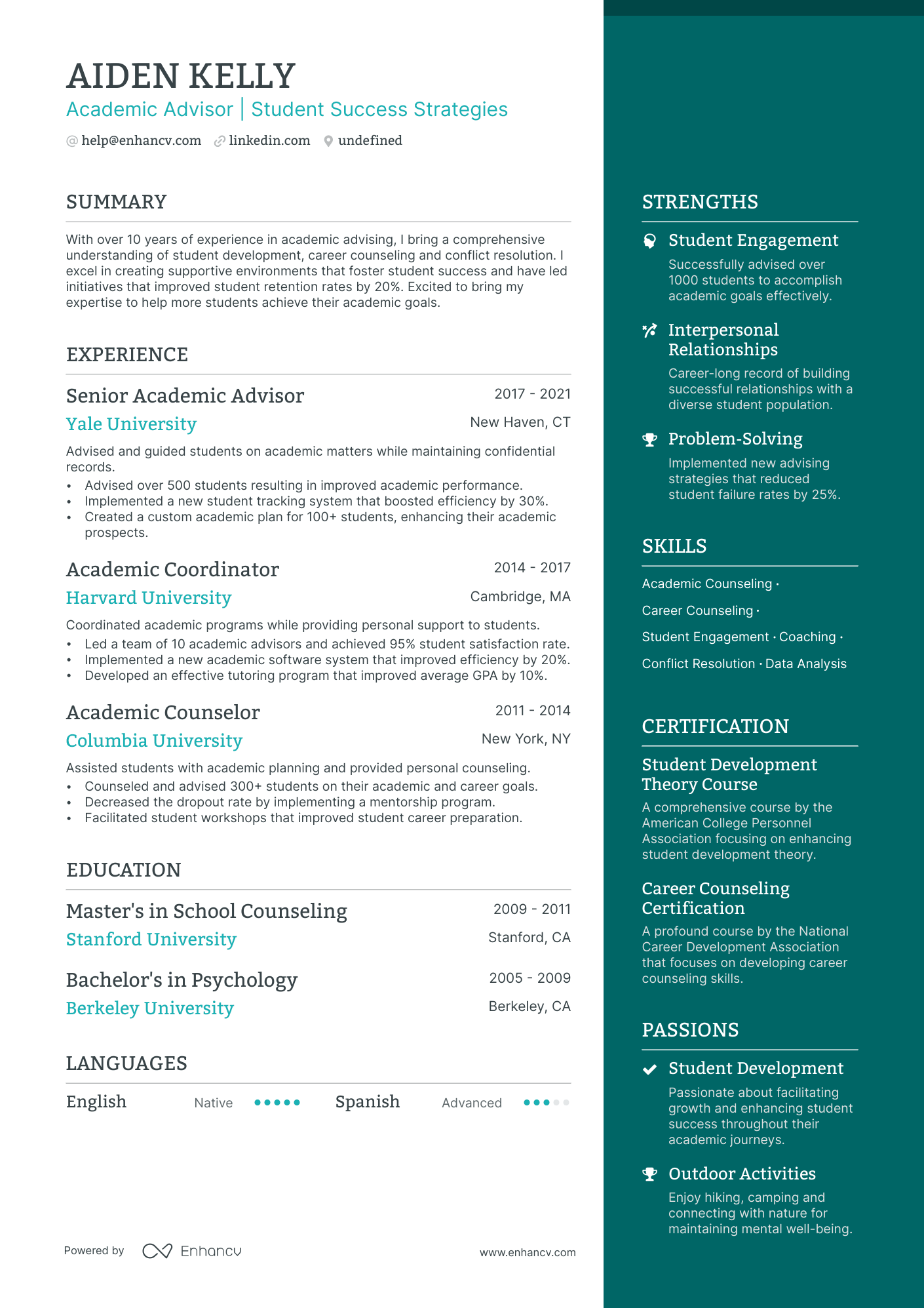
The High School Academic role serves as a link between middle school and tertiary education, playing a pivotal role in students' achievements through its unique educational skills and methodology.
Here are some suggestions on how to customize your High School Academic role application:
- Highlight your familiarity with varied teaching techniques such as project-based learning, flipped classroom or blended learning. Mention these experiences in your resume as schools are in search for innovative educators.
- Provide more than just a list of educational theories, such as Bloom's Taxonomy or Gardner's multiple intelligences. Show how you used these approaches to improve students' performance, e.g., "boosted student involvement by...", or "enhanced test scores through...”. Use the "skill-action-results" format.
- Spotlight your specific subject expertise. Should you specialize in a certain subject as most high school academics do, indicate the positive effect this has had on your students.
- Your focus should not only be on scholastic achievements. Demonstrate how you have assisted students in developing crucial skills such as leadership, societal contribution or intra/interpersonal skills, as schools deem these important in molding students.

For those seeking roles after completing their PhD, it is critical to focus on the skills and knowledge acquired during the process. Be it in academia, research or industry, your PhD status is a reflection of your specialized subject matter expertise.
Here are a few tips while applying post your PhD:
- Highlight your research, the discipline it falls under, and its impact. Avoid using jargon unless it is necessary.
- You've developed outstanding project and time management skills during your PhD, ensure to feature them prominently.
- Collaboration, networking, and team management skills should be highlighted if you have worked in labs or collaborated with other researchers or professors.
- Don't forget to feature your written and verbal communication skills developed through presenting findings, writing dissertations, and teaching.

Looking to build your own Academic resume?

- Resume Examples
How to Put Entrepreneur on Resume
Compétences linguistiques sur un cv : comment expliquer la connaissance et la maîtrise d’une langue, how to explain an employment gap on a resume, recession-proof jobs to consider in an unstable economy, pdf vs. word: when and why to send your resume, what does a president’s resume look like.
- Create Resume
- Terms of Service
- Privacy Policy
- Cookie Preferences
- Resume Templates
- Resume Builder
- Resume Summary Generator
- Resume Formats
- Resume Checker
- AI Resume Review
- Resume Skills
- How to Write a Resume
- Modern Resume Templates
- Simple Resume Templates
- Cover Letter Builder
- Cover Letter Examples
- Cover Letter Templates
- Cover Letter Formats
- How to Write a Cover Letter
- Resume Guides
- Cover Letter Guides
- Job Interview Guides
- Job Interview Questions
- Career Resources
- Meet our customers
- Career resources
- [email protected]
- English (UK)
- French (FR)
- German (DE)
- Spanish (ES)
- Swedish (SE)
Made with love by people who care.
© 2024 . All rights reserved.
- Student Appointments
- Pioneer Careers Online – PCO
- Meet the Team
- Video Library
- College of Arts Humanities, and Social Sciences
- Daniels College of Business
- Women in Engineering
- Graduate School of Professional Psychology
- Graduate School of Social Work
- Josef Korbel School of International Studies – Graduate Students
- Josef Korbel School of International Studies – Undergraduate Students
- Morgridge College of Education
- College of Natural Sciences and Mathematics
- University College
- Still Exploring
- First Generation Students
- International Students
- LGBTQ+ Students
- Students of Color
- Students with Disabilities
- Veteran Students
- Women Students
- Artificial Intelligence (AI) for Career Development
- Career Exploration
- Career Assessments
- Resumes, CVs and Cover Letters
- Interview Prep
- Job & Internship Search
- Applying to Graduate and Professional Schools
- Share Your Story
- Our Students
- Diversity, Equity, & Inclusion
- Student Employees
- Campus Employers
- Career Closet
- Make an Appointment
- Burwell Center
- Code of Conduct
- Career Peer Advisors
- Diversity, Equity & Inclusion Plan
Sample Resume Higher Education
- Share This: Share Sample Resume Higher Education on Facebook Share Sample Resume Higher Education on LinkedIn Share Sample Resume Higher Education on X
Sample resume for a student in the Master’s of Higher Education program in Morgridge College of Education.

IMAGES
VIDEO
COMMENTS
Job Search Tips. The higher education job market is competitive. Put your best foot forward and increase your chances of landing your next job in academe with the useful tips, advice, and job search strategies below. Cover Letter Advice. A well-written cover letter can be equally important as an impressive resume or CV.
With this information, we’ve created the perfect resume for applicants in various academic fields and practices. Whether you’re looking for a job as an academic advisor or wanting to advance your research or student career, we’ll show you the best nine academic resume samples that worked in 2024.
A resume is a concise, informative summary of your abilities, education, and experience.
Discover the ultimate higher education resume writing tips to land the perfect position at a college or university. Move your education career forward.
The best format for an academic resume is clear, organized, and tailored to the specific requirements of the institution you’re applying to. As a hybrid between an American-style CV and a job-seeking resume, it combines the strengths of both formats in its structure and content.
Sample resume for a student in the Master’s of Higher Education program in Morgridge College of Education. View Resource.